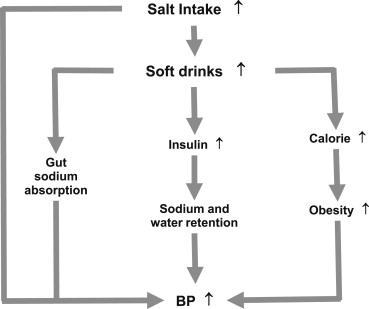In their interesting review article, Malik et al do not seem to consider the underlying mechanism by which sugar-sweetened soft drink consumption is associated with increased blood pressure. For instance, there is clear evidence for a causal relation between salt intake and total fluid consumption, as well as sugar-sweetened soft drink consumption, an important and very relevant point that Malik et al failed to acknowledge. A carefully controlled metabolic study in adult humans in which salt intake was changed has quantified the relation between the change in salt intake and the subsequent change in fluid consumption. A study in 10,074 free-living subjects across the world showed an identical relation between usual salt and fluid intake. An analysis of the National Diet and Nutrition Survey data set showed that in free-living children in Great Britain, the same relation held true. Similar findings have also been reported in the United States and Australia. There is, therefore, no doubt that in humans, like other mammals, salt is a major drive to thirst, and an increase in salt intake will increase the amount of fluid consumed, and if part of this fluid is in the form of soft drinks, they will be increased proportionately. It is therefore likely that the increased salt intake is, at least, partially responsible for the increase in blood pressure and the increase in soft drink consumption. In other words, the observed association between sugar-sweetened soft drink consumption and blood pressure may be, in part, mediated by salt intake.
As Malik et al rightly pointed out, sugar-sweetened soft drinks are the largest source of added sugar in our diet. Added sugar is a major hidden source of calories and contributes to obesity and type 2 diabetes. Some studies also suggest that the role of sugar in soft drinks in obesity might be key because it provides no feeling of satiation. It is well established that obesity is associated with an increased blood pressure. Additionally, sugar in soft drinks stimulates insulin secretion, which could lead to sodium and water retention and, thereby, possibly increasing blood pressure. The suggested mechanism for the links between salt intake, sugar-sweetened soft drink consumption, and blood pressure is shown in Figure 1 .

Raised blood pressure throughout its range is a major cause of cardiovascular disease, accounting for 62% of strokes and 49% of coronary heart disease. A reduction in population salt intake, which can easily be made by slowly reducing the amounts of salt added to foods by the food industry, will lead to a reduction in population blood pressure and cardiovascular mortality, as demonstrated in the United Kingdom and Finland. Furthermore, a reduction in salt intake will cause a reduction in sugar-sweetened soft drink consumption and, thereby, a decrease in obesity and type 2 diabetes.
Efforts to reduce soft drink consumption combined with a gradual reduction in the amounts of sugar added to soft drinks will provide additional beneficial effects on health. An action group (Action on Sugar) was recently set up with a mission to achieve a gradual and sustained reduction in the amounts of sugar added to foods and drinks, following a similar model to the UK salt reduction program pioneered by Consensus Action on Salt and Health. This model has become one of the most successful nutritional policies in the United Kingdom since the Second World War, by setting progressively lower salt targets for >80 categories of foods for the food industry to achieve within a certain time frame. As this is done slowly, people do not notice the difference in taste. A reduction in population salt and sugar intake, even by a small amount, will have a major beneficial effect on health along with major cost savings.
Stay updated, free articles. Join our Telegram channel

Full access? Get Clinical Tree


